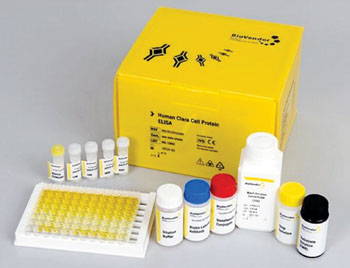Fructose Ingestion Stimulates Hormone Leading to Fructose Tolerance Test
By LabMedica International staff writers
Posted on 04 Nov 2014
The determination of the body's metabolic response to fructose has been very difficult, and consequently, there is no fructose tolerance test to warn of impaired or altered fructose metabolism. Posted on 04 Nov 2014
Fibroblast growth factor 21 (FGF21) is a recently discovered hormone produced primarily by key metabolic tissues including the liver and adipose tissue which has pleiotropic actions on glucose and lipid homeostasis and theoretically fructose ingestion might acutely stimulate production of FGF21.

Image: An enzyme-linked immunosorbent assay kit for measuring protein markers (Photo courtesy of BioVendor USA).
Endocrinologists at the Beth Israel Deaconess Medical Center (Boston, MA, USA) recruited 10 lean, healthy study subjects and 11 patients with metabolic syndrome. They first tested the effect of glucose on FGF21 by giving volunteers a drink of 75 grams of glucose and measuring serum levels of glucose, cholesterol, and triglyceride levels which were analyzed over the course of five hours. Insulin samples were measured by radioimmunoassay (Millipore; Billerica, MA, USA). The study subjects were later given 75 grams of fructose or a combination of 37.5 grams of fructose and 37.5 grams of glucose dissolved in 225 mL water.
Serum FGF21 levels were measured using a commercially available enzyme-linked immunosorbent assay (BioVendor USA; Candler, NC, USA) from blood collected in aprotinin-pretreated tubes and were stored at -80 °C until use. Metabolic syndrome subjects had lower high-density lipoprotein (HDL) cholesterol, higher systolic blood pressure, and higher fasting and two-hour glycemia during an oral glucose tolerance test. However, after ingesting 75 grams of fructose, FGF21 levels dramatically increased by an average of 400% within only two hours.
Eleftheria Maratos-Flier, MD, a professor of Medicine and senior author of the study said, “This study tells us that fructose actively regulates FGF21 in humans. The hormone-like response of FGF21 to fructose ingestion suggests that FGF21 might play an unanticipated role in regulating fructose metabolism. We were totally surprised by this dramatic effect because, to date, there has been no way of assessing the body's acute metabolic response to fructose ingestion. We haven't had a simple quick test like we have for glucose.” The study was published on October 8, 2014, in the journal Molecular Metabolism.
Related Links:
Beth Israel Deaconess Medical Center
Millipore
BioVendor USA







 Analyzer.jpg)





